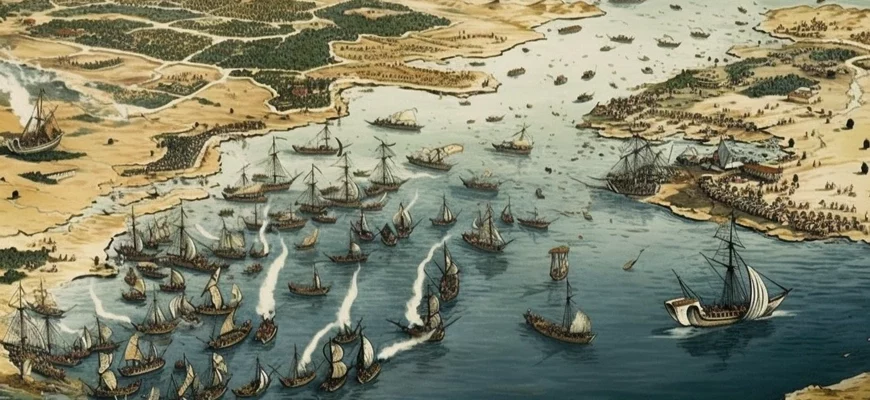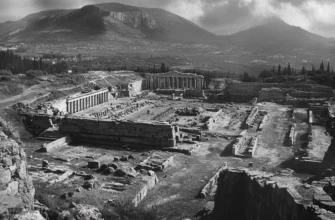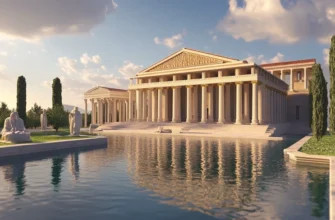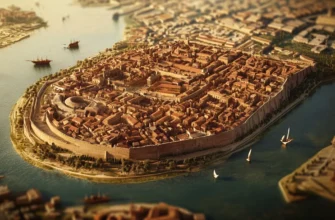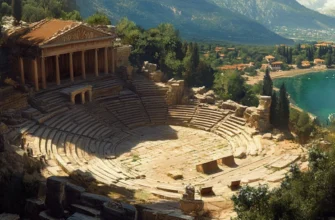Before the start of the Greco-Persian Wars, Greece and Persia had a complicated relationship. On the one hand, Greece consisted of independent city-states that were known for their democratic forms of government and actively developed culture, science, and art. On the other hand, Persia was a powerful empire that possessed vast territories and a large army.
In the 5th century BC, the Persian king Darius I attempted to conquer Greece, but his expedition to Athens in 490 BC ended in defeat at the Battle of Marathon. After that, Persia ceased its attacks on Greece for a while, but relations between the states remained tense.
In the following decades, Persia pursued a policy of division among the Greek city-states, supporting some and calling on others to engage in open military confrontation with other Greek states. In 480 BC, the Persian king Xerxes I once again assembled an army to invade Greece, paving the way for the start of the Second Greco-Persian War.
- Political and cultural differences between the Greeks and Persians
- Reasons for the start of the wars
- The First Greco-Persian War: causes and consequences
- The Battle of Marathon and its consequences
- The role of Athens in the victory over the Persians
- Consequences of the war for Greece and Persia
- The Second Greco-Persian War: the Battle of Thermopylae and Salamis
- The Battle of Thermopylae and its consequences
- The role of Sparta in the victory over the Persians
- The Battle of Salamis and its consequences
- The Third Greco-Persian War: the Battle of Gaugamela and the consequences of the war for Greece and Persia
- The Battle of Gaugamela and its consequences
- Macedonia’s role in the victory over the Persians
- Conclusions
Political and cultural differences between the Greeks and Persians
The Greeks and Persians had significant political and cultural differences. Greek city-states were characterized by democratic forms of government, where every citizen had the right to vote and make decisions at general assemblies. In addition, the Greeks placed great emphasis on science, art, and philosophy.
At the same time, the Persians had a monarchical form of government, where power belonged to the shah and his close associates. The Persians were also distinguished by their religion, based on the cult of magic and sacrifice. Persian culture differed from Greek culture in its traditions and rituals.
The political and cultural differences between the Greeks and Persians became one of the factors contributing to the conflict between the states. The Greeks defended their right to democracy and freedom, while the Persians tried to impose their monarchical form of government on Greece.
Reasons for the start of the wars
One of the main reasons for the Greco-Persian Wars was the expansion of the Persian Empire into Greece. The Persian king Darius I sought to expand his dominion over neighboring states, including the Greek city-states, which were relatively weak. The second reason was the Greeks’ defense of their democratic and liberal ideas and their opposition to imperial tyranny.
The third reason was the persecution of local Greek tyrants, who turned to the Persian king for help in returning to power. This led to the intervention of the Persian Empire in the internal affairs of Greece and caused a major conflict between the states.
In addition, there were also economic and territorial reasons, such as competition for control of trade routes and resources, which also contributed to the deterioration of relations between Greece and Persia.
The First Greco-Persian War: causes and consequences
The First Greco-Persian War began in 492 BC and lasted until 490 BC. The main reason for the war was the attempt by the Persian king Darius I to punish Athens for supporting his enemies in Ionia. The first Persian army to land on Greek territory was destroyed by an Athenian detachment that landed on the Marathon plain in 490 BC.
The result of this war was the victory of the Greeks at the Battle of Marathon, which allowed Athens to maintain its independence and freedom. The brilliant tactician and strategist Miltiades, who led the Greek army at the Battle of Marathon, played a major role in the victory of the Greeks. After this victory, the troops of the Persian king Darius I were forced to retreat, and Greece retained its independence. The First Greco-Persian War was an important stage in the history of Greece and the Persian Empire, which determined the further course of events in the region.
The Battle of Marathon and its consequences
The Battle of Marathon, which took place in 490 BC, was a decisive stage in the First Greco-Persian War. The brilliant tactician and strategist Miltiades led the Greek army and successfully forced the Persian army to retreat. In this battle, the Athenian troops won a victory over the vastly superior forces of the Persian king Darius I.
This victory resulted in the preservation of Athens’ independence and the general mood of the Greeks to defend their culture and civilization. The victory of the Greeks at Marathon became a symbol of the spiritual strength and heroism of the Greeks and increased the authority of the Greek state in the international arena. It also served as an impetus for the further development of democracy in Greece and the flourishing of its culture, which later led to the heyday of ancient Greece.
The role of Athens in the victory over the Persians
Athens played a leading role in the First Greco-Persian War and made a significant contribution to the victory over the Persians. Athens sent its best warriors to Marathon, including the legendary Athenian troops, who became the main heroes of the victory.
The Athenian politician and strategist Miltiades successfully commanded the battle, devising a plan that allowed the Greeks to defeat the Persians despite their superior military strength. After the victory, the Athenian warriors used their strategic advantage to quickly return to Athens, where they were welcomed as heroes.
The victory of the Greeks at Marathon, particularly the Athenian warriors, became a symbol of the struggle for freedom and independence and demonstrated the significant potential of the Greek state to preserve its culture and civilization.
Consequences of the war for Greece and Persia
The consequences of the First Greco-Persian War were significant for both sides. For Greece, it was a victory that strengthened its influence in the region and allowed it to preserve its independence and cultural identity. It also influenced the development of the Greek states, which continued their struggle for influence in the region.
For Persia, it was a defeat that reduced its prestige and influence in the region. Despite this, the Persians did not abandon their plans to conquer Greece, and the following years were marked by new wars between the two states.
The First Greco-Persian War was also an important event in the history of world civilization, as it reflects the struggle between Western and Eastern European cultures and highlights the importance of democracy, which was first introduced by the Athenian rulers in their state.
The Second Greco-Persian War: the Battle of Thermopylae and Salamis
The Second Greco-Persian War began when the Persian king Xerxes I revived his father Darius I’s plan to conquer Greece. The main reason for the war was Persia’s desire to expand its influence in the Mediterranean and Eastern Europe.
The Battle of Thermopylae was one of the most famous battles of this war. The Greek warrior Leonidas and his 300 Spartans held the pass through the mountains against the Persian army, which consisted of a million soldiers. This battle was a symbol of heroism and devotion to one’s country, but in the end, the Greeks lost Thermopylae.
The Battle of Salamis was the next major battle of the war. The Greek navy managed to defeat the Persian navy, inflicting heavy losses on them. This victory allowed Greece to continue the fight and preserve its independence.
The consequences of the war were significant for both sides. For Greece, it was a victory that allowed it to preserve its independence and cultural identity. For Persia, it was a defeat that halted its plans to expand its influence in the Mediterranean and Eastern Europe.
The Second Greco-Persian War was also important in the development of Greek civilization. It strengthened its influence in the region and gave impetus to the further development of democracy and philosophy.
The Battle of Thermopylae and its consequences
The Battle of Thermopylae was one of the most famous battles of the Second Greco-Persian War, where about 7,000 Greeks under the command of Leonidas and Herodotus stopped the Persian army in 480 BC on the slopes of a mountain pass. This allowed the Greeks to prepare for battle with the help of their fleet and military units. Despite their defeat, the heroism of the Greeks at Thermopylae aroused patriotic feelings among the population and became an important symbol of the struggle against Persian aggression.
The role of Sparta in the victory over the Persians
Sparta played an important role in the victory over the Persians in the Second Greco-Persian War. After the defeat at Thermopylae, the Spartan king Leonidas was killed, but his death became a symbol of heroism and the struggle against Persian aggression. After that, Sparta became the leading force of the Greek coalition and led a military detachment which, together with the Athenian fleet, defeated the Persian forces in the Battle of Salamis. This victory stopped the Persian offensive invasion of Greece and decided the fate of the war in favor of the Greeks.
The Battle of Salamis and its consequences
The Battle of Salamis took place in 480 BC during the Second Greco-Persian War, where the Athenian fleet under the command of Themistocles defeated the Persian fleet supporting the offensive campaign of the Persian forces in Greece. This victory stopped the Persian offensive invasion of Greece and turned the tide of the war in favor of the Greeks. The battle strengthened the unity of the Greek city-states, which united to fight against Persian aggression, and reduced Persia’s influence in the region. The Battle of Salamis was a decisive stage in the Greeks’ struggle for independence from Persian rule.
The Third Greco-Persian War: the Battle of Gaugamela and the consequences of the war for Greece and Persia
The Third Greco-Persian War took place in the 4th century BC and ended with the victory of the Macedonian king Alexander the Great over the Persian king Darius III. The Battle of Gaugamela, which took place in 331 BC, was the decisive battle in this war, where the Macedonian army defeated the Persian army, inflicting a decisive defeat on it. The result of this war was the spread of Greek culture in Persia and the East, as well as a change in the political landscape of the region. The Persian Empire lost its influence in the region, and Macedonia became the new dominant power. In addition, this war gave impetus to the further development of Greek culture and philosophy, which became known to the world community.
The Battle of Gaugamela and its consequences
The Battle of Gaugamela was the decisive battle in the Third Greco-Persian War, in which the Macedonian king Alexander the Great defeated the Persian king Darius III. The consequences of this victory were the spread of Greek culture in Persia and the East, as well as changes in the political landscape of the region. The Persian Empire lost its influence in the region, and Macedonia became the new dominant power. In addition, this battle determined the nature of the Macedonian Empire’s further expansion into Asia and Africa, which contributed to the further spread of Greek culture throughout the world.
Macedonia’s role in the victory over the Persians
Macedonia, led by Alexander the Great, played a key role in the victory over the Persians in the Third Greco-Persian War. Alexander the Great led the Macedonian army eastward, conquering Persia and becoming the first Greek ruler to subjugate the Persian kings. Thanks to Alexander’s military experience and strategic thinking, the Macedonian army managed to defeat the Persian army in the battles of Gaugamela, Issus, and Gaugamela. The victory resulted in the strengthening of Macedonian power in the region and the spread of Greek culture throughout the world, which contributed to the further development of art, science, and philosophy.
Conclusions
This article on the Greco-Persian Wars provides a detailed account of the history of relations between Greece and Persia, the causes of the conflict, and the events of each of the wars, including the battles of Marathon, Thermopylae, and Salamis. The roles of Athens and Sparta in the victory over the Persians are also examined. The Battle of Gaugamela and the role of Macedonia in the war are described. The consequences of the wars for Greece, Persia, and the entire Mediterranean region are also discussed. A conclusion is made about the significance of the Greco-Persian Wars for world history.
